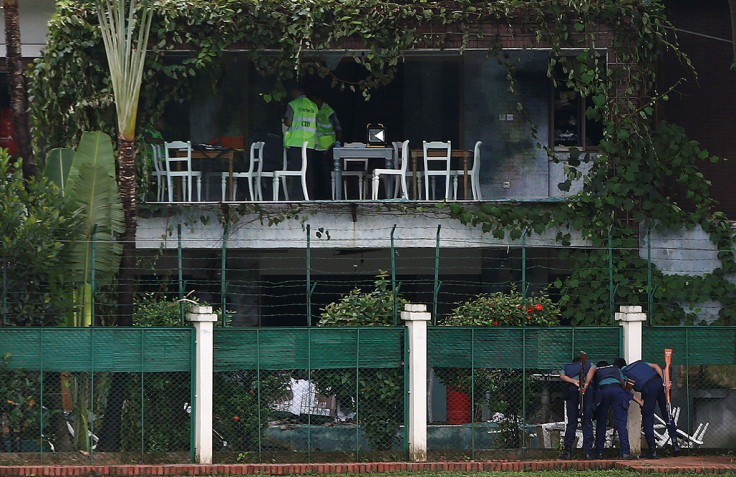Dhaka attack: Bangladesh politician 'shocked' over son's role in terrorist attack on café
Imitaz Khan Babul had 'no inkling' of his son's intent, fears young Bangladeshis being radicalised.

A politician from Bangladesh's governing party has spoken out over his son's role in the terrorist attack on a café in Dhaka on 1 July. After recognising his son in pictures of the attackers published in the media, Imitaz Khan Babul, leader of the Awami League Party's Dhaka City chapter, has spoken of his shock over the incident.
Babul, who is also the deputy secretary general of the Bangladesh Olympic Association, has said that he had "no inkling" about his son's radicalisation. Bangladesh has been in shock after it was revealed that the attackers who killed 20 people at the Holy Artisan Bakery were from educated and wealthy families.
Babul told the BBC: "I am stunned to learn this, dumbfounded. My son used to pray five times a day from a young age. But we never imagined this. There was nothing at home, no books or anything to indicate he was leaning that way, so we had no inkling."
Babul's son was killed by Bangladeshi security officials when they stormed the café. The Islamic State (Isis) terrorist group has claimed responsibility for the attack, however, the Bangladeshi government has denied this, stating that the attackers had no links to them and that some of them appeared to have links to locally banned militant group, Jamaeytul Mujahdeen Bangladesh.
Babul has now warned that he believes young Bangladeshi men are being radicalised online. The attackers had been missing from their homes for six months before they appeared to commit the attack in Dhaka According to a police official, Babul's son told his family he was going for a "pilgrimage" and then never returned.
Babul said: "When I was searching for my son I found that many other boys are missing. Well-educated boys from good, educated families, children of professionals, government officers. I used to share my sorrows with them. We do not know how this is happening."
Many have taken to social media in the aftermath of the attack to comment on the background of the attackers.
Unfortunate how these 18-22 yr old well educated boys turned into terrorists !
— कोमल :) (@Komal_Indian) July 5, 2016
Hatred leads one nowhere 😢#Dhaka pic.twitter.com/e35j8DG32B
Guess who was this guy taking selfie?
— Kiran Kumar S (@KiranKS) July 4, 2016
A wealthy, University educated, non oppressed and non-madrasa Jihadi.#Dhaka pic.twitter.com/FNSrYomssO
The Islamist murderers in #Dhaka were educated and from affluent families? The plague that is Islamic terror is evolving. Is there no hope?
— Siddharth (@Actor_Siddharth) July 3, 2016
#dhakaattack ers are educated studying@ good schools and best unis, not typical madrasa going :/ https://t.co/s15lwa7hsu via @dailystarnews
— Sadaf Noor (@sadaf2605) July 3, 2016
1 takeaway of #Dhaka hostage incident: Poverty has no co-relation with terrorism. Killers are affluent;foreign educated. Radicalised by ISIS
— Shantanu N Sharma (@shantanunandan2) July 3, 2016
All the terrorists who attacked #Dhaka were highly educated young men and went to university. No one from madrassa!https://t.co/rp5qlCZlyL
— Kiran Kumar S (@KiranKS) July 3, 2016
Dhaka terrorists were not dirt poor, illiterate individuals. They, from the pics available and accounts one read, were educated and urbane.
— Sreemoy Talukdar (@sreemoytalukdar) July 3, 2016
#Dhaka terrorists were well educated from elite families, will liberals now stop this farce of "poor" & "illiterate" youth misguided?
— Devika (@Dayweekaa) July 3, 2016
Young, well-to-do, educated -the profile of #Dhaka terrorists is antithetical to the commonly-held view of terrorists as poor and uneducated
— Hemant (@hemantbuch) July 3, 2016
Dhaka terror attack bursts the myth that terrorists are from the marginalised section of society, educated in Madarsas.
— Ray Stings (@Purba_Ray) July 3, 2016
© Copyright IBTimes 2025. All rights reserved.






















